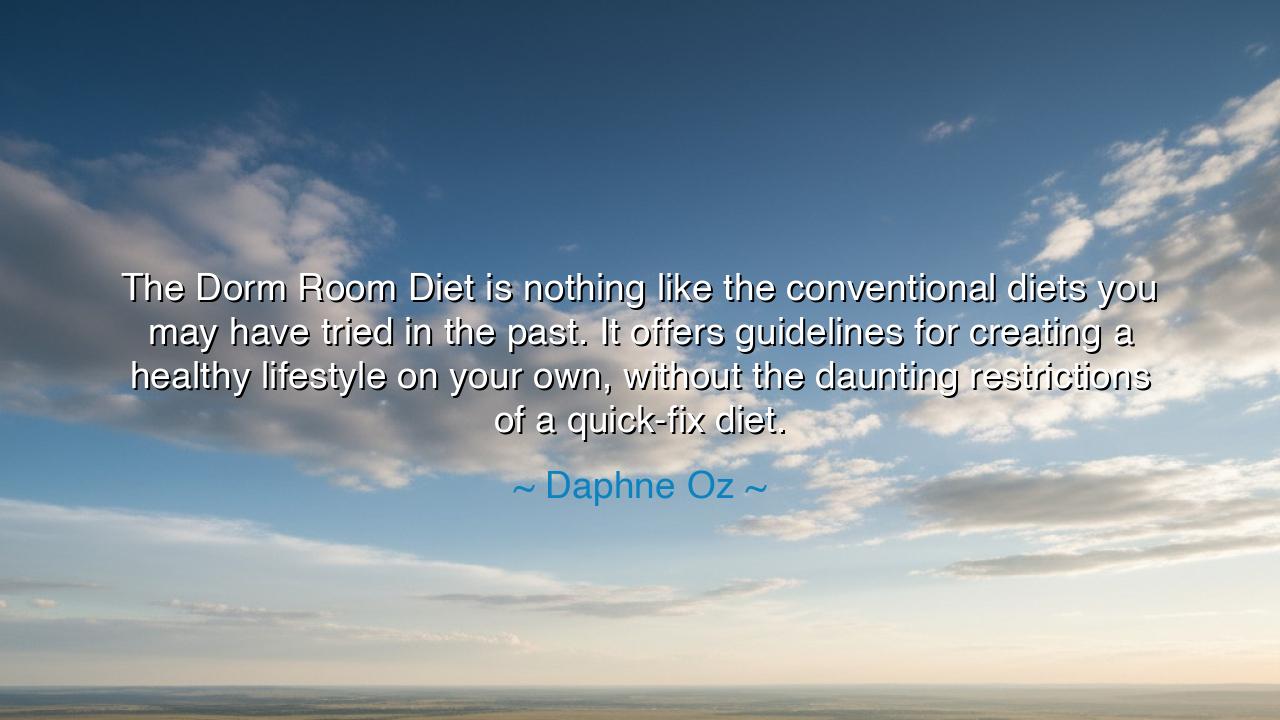
The Dorm Room Diet is nothing like the conventional diets you may
The Dorm Room Diet is nothing like the conventional diets you may have tried in the past. It offers guidelines for creating a healthy lifestyle on your own, without the daunting restrictions of a quick-fix diet.






"The Dorm Room Diet is nothing like the conventional diets you may have tried in the past. It offers guidelines for creating a healthy lifestyle on your own, without the daunting restrictions of a quick-fix diet." – Daphne Oz
In these words, Daphne Oz speaks with the voice of balance and renewal. Her teaching rises not from the vanity of appearance but from the wisdom of sustainability—from the sacred art of building health that endures. When she says her way is “nothing like the conventional diets,” she speaks against the tyranny of fleeting remedies, those quick-fix diets that promise transformation but deliver only exhaustion. Hers is a message of freedom, a call to live with awareness and intention rather than with chains of denial. She teaches that true health is not born from restriction, but from relationship—with food, with body, and with self.
In the age of haste, many chase health as they would chase gold: feverishly, impatiently, without reverence. They leap from one formula to another, trading the joy of living for the illusion of control. But Daphne Oz reminds us that wellness cannot be demanded—it must be cultivated. Just as a tree cannot be forced to bear fruit overnight, the body cannot be coerced into vitality through deprivation. Her “Dorm Room Diet” is not a set of punishments but a way of life, a guideline for harmony that empowers each soul to take stewardship of their own well-being. It is a return to wisdom older than any modern fad: moderation, self-knowledge, and joy in nourishment.
The ancients knew this truth well. In the schools of Athens, Hippocrates, the father of medicine, taught his students that food was the first medicine. He did not speak of denial or restriction, but of balance and rhythm—that one should eat in accordance with the body’s needs, the seasons of the earth, and the labors of the day. He warned that unnatural speed in the pursuit of health leads to decay, not strength. Daphne’s philosophy follows this same path. She calls upon us to abandon the idea of fixing ourselves as though we were broken machines, and to embrace instead the gentle craft of self-care—an art that grows from patience, not panic.
Her message is particularly directed toward the young—the students in dorm rooms, standing on the threshold of independence. For it is in youth that habits are forged, and the body learns the rhythms that will sustain or betray it in later years. She offers these students not rules, but guidelines, because the path to health is not a single road—it is a landscape to be explored with mindfulness. She teaches them that freedom and responsibility are not enemies, but companions: one grants choice, the other gives purpose. In learning to eat, move, and rest with awareness, each young person becomes the architect of their own vitality.
There is a story told of Zeno of Citium, founder of Stoicism, who once lost his fortune in a shipwreck. When asked if he despaired, he replied, “Now I have a better opportunity to learn how to live.” Daphne Oz’s philosophy mirrors that same spirit. When life’s structures fall away—when parents no longer dictate meals, when schedules grow chaotic, when one faces solitude for the first time—this is not a loss, but a beginning. It is the moment to learn how to live wisely, to craft one’s own harmony without the “daunting restrictions” of imposed order. Thus, her words are not merely dietary—they are philosophical, a guide for independence and inner strength.
The origin of her teaching lies in compassion, not control. She understands that the body thrives when it is treated as a partner, not an adversary. In rejecting the quick-fix diet, she rejects the culture of punishment that has enslaved so many minds. Instead, she offers a covenant of self-respect—a way to eat and live that honors the rhythm of one’s own life. For what good is a diet that strips joy from the heart or leaves one weary in spirit? To live well, she teaches, is to find pleasure in balance, not pride in deprivation.
The lesson, then, is clear: seek balance, not bondage. Do not fall prey to the false prophets of instant change. Instead, cultivate a way of living that is both joyful and sustainable. Begin each day with gratitude for your body; feed it as you would feed a friend—with kindness, not cruelty. Move not to punish yourself, but to celebrate your vitality. Rest without guilt. Eat without fear. Remember that the goal is not to become smaller, but to become stronger, freer, and more alive.
Let these words endure as a guide for all who strive for health in a hurried age: a healthy lifestyle is not a race to perfection, but a lifelong conversation between the self and the soul. As Daphne Oz teaches, freedom and discipline, joy and nourishment, must walk hand in hand. For when we learn to live this way—without the “daunting restrictions” of fear—we rediscover the oldest truth of all: that wellness is not a destination, but a way of being, radiant and whole.






AAdministratorAdministrator
Welcome, honored guests. Please leave a comment, we will respond soon